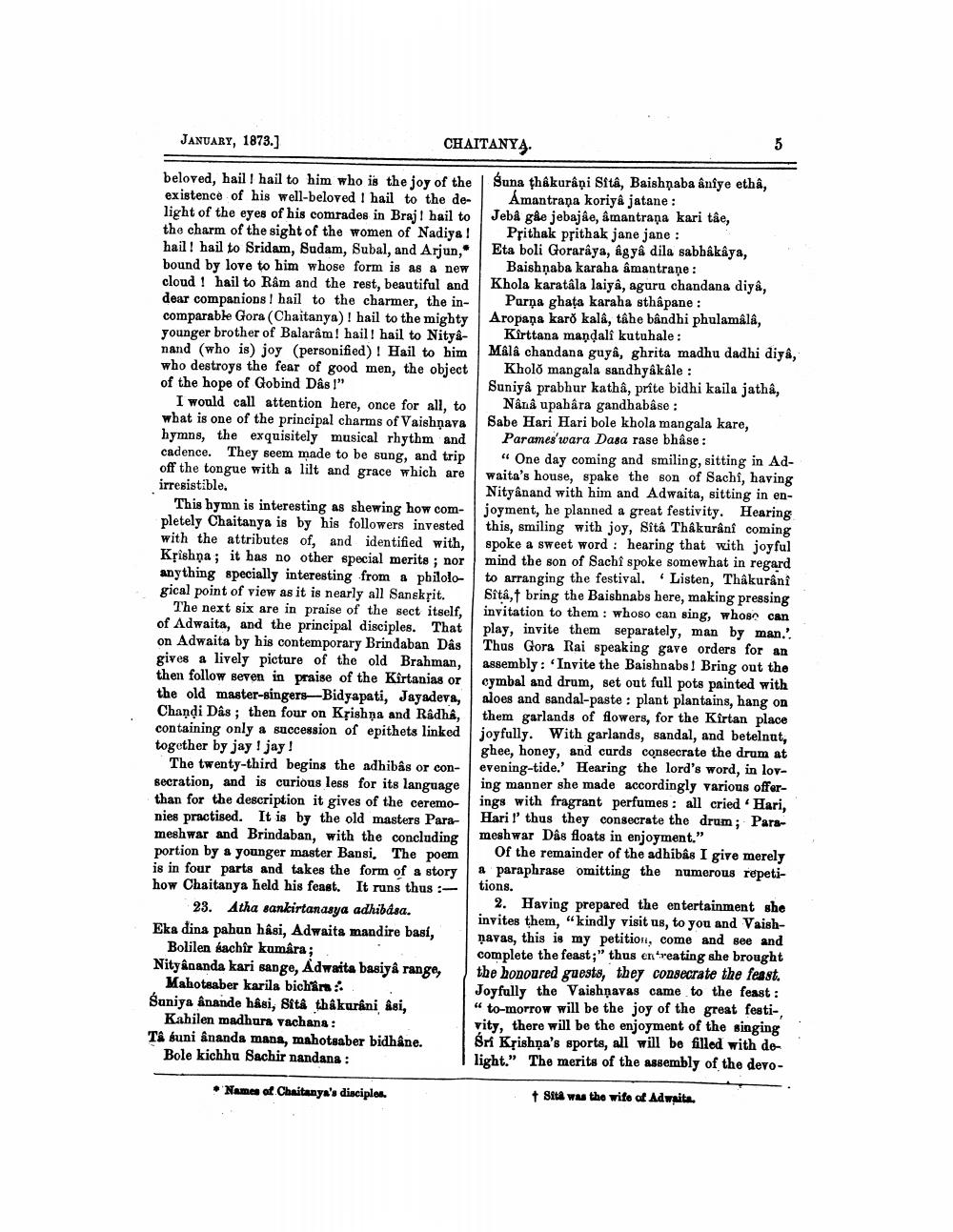________________
JANUARY, 1873.]
beloved, hail! hail to him who is the joy of the existence of his well-beloved I hail to the delight of the eyes of his comrades in Braj! hail to the charm of the sight of the women of Nadiya ! hail! hail to Sridam, Sudam, Subal, and Arjun, bound by love to him whose form is as a new cloud! hail to Râm and the rest, beautiful and dear companions! hail to the charmer, the incomparable Gora (Chaitanya)! hail to the mighty younger brother of Balarâm! hail! hail to Nityanand (who is) joy (personified)! Hail to him who destroys the fear of good men, the object of the hope of Gobind Dâs !"
I would call attention here, once for all, to what is one of the principal charms of Vaishnava hymns, the exquisitely musical rhythm and cadence. They seem made to be sung, and trip off the tongue with a lilt and grace which are irresistible.
CHAITANYA.
This hymn is interesting as shewing how completely Chaitanya is by his followers invested with the attributes of, and identified with, Krishna; it has no other special merits; nor anything specially interesting from a philological point of view as it is nearly all Sanskrit.
The next six are in praise of the sect itself, of Adwaita, and the principal disciples. That on Adwaita by his contemporary Brindaban Dâs gives a lively picture of the old Brahman, then follow seven in praise of the Kirtanias or the old master-singers-Bidyapati, Jayadeva, Chandi Dâs; then four on Krishna and Radha, containing only a succession of epithets linked together by jay jay!
The twenty-third begins the adhibâs or consecration, and is curious less for its language than for the description it gives of the ceremonies practised. It is by the old masters Parameshwar and Brindaban, with the concluding portion by a younger master Bansi. The poem is in four parts and takes the form of a story how Chaitanya held his feast. It runs thus:
23. Atha sankirtanasya adhibása. Eka dina pahun hâsi, Adwaita mandire basí, Bolilen sachir kumara;
Nityananda kari sange, Adwaita basiyâ range, Mahotsaber karila bichara: Suniya ânande hâsi, Sitâ thâkurâni âsi, Kahilen madhura vachana:
Ta suni ânanda mana, mahotsaber bidhâne. Bole kichhu Sachir nandana:
Names of Chaitanya's disciples.
Suna thakurâni Sitâ, Baishnaba ânîye ethâ, Amantrana koriya jatane:
Jebâ gâe jebajâe, âmantrapa kari tâe, Prithak prithak jane jane:
Eta boli Gorarâya, ágya dila sabbâkâya, Baishnaba karaha âmantrane:
Khola karatâla laiyâ, aguru chandana diyâ, Purna ghata karaha sthâpane:
Aropana karo kalâ, tâhe bândhi phulamâlâ,
5
Kirttana mandali kutuhale:
Mâlâ chandana guyâ, ghrita madhu dadhi diyâ, Kholo mangala sandhyâkâle :
Suniyâ prabhur kathâ, prîte bidhi kaila jathâ, Nânâ upahára gandhabâse:
Sabe Hari Hari bole khola mangala kare, Parames'wara Dasa rase bhâse:
"One day coming and smiling, sitting in Adwaita's house, spake the son of Sachî, having Nityanand with him and Adwaita, sitting in enjoyment, he planned a great festivity. Hearing this, smiling with joy, Sîtâ Thâkurânî coming spoke a sweet word hearing that with joyful mind the son of Sachi spoke somewhat in regard to arranging the festival. Listen, Thâkurânî Sîtâ,† bring the Baishnabs here, making pressing invitation to them: whoso can sing, whose can play, invite them separately, man by man.'. Thus Gora Rai speaking gave orders for an assembly: 'Invite the Baishnabs! Bring out the cymbal and drum, set out full pots painted with aloes and sandal-paste: plant plantains, hang on them garlands of flowers, for the Kirtan place joyfully. With garlands, sandal, and betelnut, ghee, honey, and curds consecrate the drum at evening-tide.' Hearing the lord's word, in loving manner she made accordingly various offerings with fragrant perfumes: all cried 'Hari, Hari' thus they consecrate the drum; Parameshwar Dâs floats in enjoyment."
Of the remainder of the adhibâs I give merely a paraphrase omitting the numerous repeti
tions.
2. Having prepared the entertainment she invites them, "kindly visit us, to you and Vaishnavas, this is my petition, come and see and complete the feast;" thus entreating she brought the honoured guests, they consecrate the feast. Joyfully the Vaishnavas came to the feast: "to-morrow will be the joy of the great festi-, vity, there will be the enjoyment of the singing Sri Krishna's sports, all will be filled with delight." The merits of the assembly of the devo
† Sita was the wife of Adwaita.




